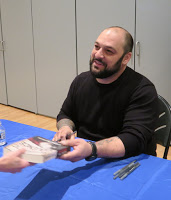Ex-skinhead helps others break away from white supremacist groups
 |
| Christian Picciolini signs his book. |
Christian Picciolini spent years as a white supremacist and neo-Nazi, beating up minorities, performing in a skinhead rock band, and spreading a message of hate.
Eventually, he started to disengage from his violent past and formed an organization to help other hateful extremists break away from “alt-right” and jihadist movements.
Picciolini, the author of Romantic Violence: Memoirs of an American Skinhead, shared his story at Temple Rodef Shalom in Falls Church Sept. 6.
The violent white supremacist rally in Charlottesville last month was nothing new, Picciolini said. Events like that have going for decades, but the rhetoric coming out of Donald Trump’s presidential campaign emboldened far-right extremists to become more open.
Greatest terror threat
Picciolini called the white supremacist movement “the greatest terror threat we’re facing today,” It’s much bigger than the threat posed by Islamic jihadists or any other hate group.
There are some 300,000 far-right militia members undergoing paramilitary training, he said. “If we had 300 Isis supporters training here, we wouldn’t hesitate to drop a bomb on them.”
“Yet we still don’t call white supremacists terrorists,” he said, even though their objective is to incite fear and violence.

The white supremacist movement has changed over the years. Thirty years ago, they were skin heads covered in tattoos. Now they try to look and sound like regular people; they wear suits – or white polos and khakis like the marchers in Charlottesville – recruit on college campuses, get jobs in law enforcement, and get military training, he said. “This was a concerted strategy to blend in.”
Most people aren’t drawn to hate groups because of ideology; they often have personal problems and are searching for a group who will accept them, he said. “Recruiters are savvy in identifying vulnerable people.”
“So many people become radicalized online. They’re looking for something they can’t find in the real world,” he said.
We’re all human
Picciolini started to question his own place in the movement after marrying and having children, although he continued to believe in the ideology. He opened a record shop to sell white-power music imported from Europe, but realized that if he wanted to make a profit, he had to offer other kinds of music, too, and that attracted more diverse customers, including blacks, Jews, and gays.
“These people who were my sworn enemies saw something in me that I didn’t see in myself. They showed me compassion,” he said.
Then everything fell apart in his life, he said. His wife left him, he didn’t have a good relationship with his family, and he had to sell his store.
Eventually he got a job at IBM and was assigned to install computers in his old high school, where he ran into the African-American security guard who he’d gotten into a fistfight with when he was a student.
Picciolini apologized, and the man urged him to tell his story. When he began to speak publicly about his past, “it was as if a million pounds were lifted off my back,” he says.
Picciolini went on to found a group called ExitUSA for people who want to leave extremist groups but don’t know how.
In one case, Picciolini flew to Buffalo, N.Y., to meet a man, whom he referred to as “John,” who had told him he saw a Muslim man praying in a park and wanted to attack him – and that he had never met a Muslim before.
Picciolini brought John to the local mosque to meet the imam. The two ended up bonding over Chuck Norris and old Westerns and after two and a-half hours, they were hugging and crying. They eventually became friends and John volunteers at the mosque.
In another case, Picciolini told about a call he’d received from the parents of a 17-year-old girl in Florida whom they said had gotten involved in making white supremacist propaganda videos with a 23-year-old man in Idaho whom she met online.
Picciolini discovered the man was really a 30-year-old sexual predator with dozens of aliases who had blackmailed many girls into sending him explicit pictures, was connected with Russia, and had created hundreds of social media profiles to put out pro-Trump messages.
Building resilience
When speaking to people involved with hate groups, Picciolini said it’s best to avoid arguments about ideology and politics. Instead, he looks for what he calls “potholes” – troubles in their lives such as addiction, trauma, poverty, family conflicts, or chronic unemployment.
“I fill in those potholes,” he said, by providing resources – such as referring them to mental health counseling, job training, drug rehab, or tattoo removal services – to make them more resilient and self-confident.
When those issues are addressed, they feel less likely to blame others for their problems, and then it becomes more constructive to talk about ideology.
Eventually, he brings them into contact with people from groups that had been victimized. He has had clients meet with a Holocaust survivor, have dinner with a Muslim family, and volunteer at an LGBTQ center, for example.
“Once they make a human connection, they are able to humanize these people,” Picciolini said.
Picciolini challenged the audience to “find someone who doesn’t deserve your respect or compassion and talk to them. He said, “There is hope; people can change.”


A wonderful article; thank you.